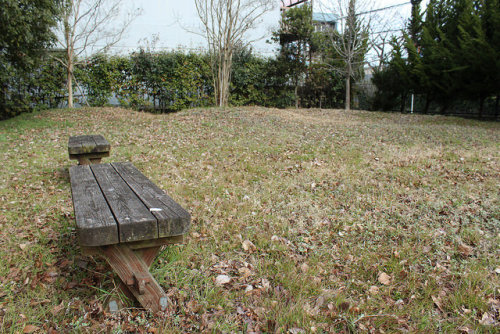#rippling waves
IMG_1113 on Flickr.
古 人尓和礼有哉 樂浪乃 故京乎 見者悲寸
古の人に我れあれや楽浪の古き都を見れば悲しき
Is it that I am in fact a person of old? When I gaze upon the old capital of the rippling waves, I am grieved…
Takechi no Furuhito, MYS 1-32
The best part about this poem, in my opinion, is that the poet is named 高市古人 - in other words, he has a pun on his own name within the poem. He asks if he is a person of old - while his name literally means “person of old.”
Outside of its cleverness in that respect, of course, this poem fits in with the other poems in Man'yoshu composed on viewing the ruins of the Ōmi capital, where the court of Emperor Tenchi once stood. Ōmi was known as the capital “of the rippling waves” (sasanami no), presumably because of its location on the shores of Lake Biwa, but the characters used to write this epithet (makura kotoba) are strangely the same as those for the Han commandery of Lelang (108 BCE - 313 CE) on the Korean peninsula - something I’ve always wondered about (“Sasanami” is not a natural reading for 樂浪; the choice of these characters for this epithet would seem to be deliberate; yet I’ve seen very little scholarship as yet that problematizes this orthography). In any case, due to the politically sensitive nature of talking about Tenchi and his reign during the so-called Tenmu dynasty (the Jinshin War of 672 having basically been a war of succession in which Tenmu, Tenchi’s brother, beat out Ōtomo, Tenchi’s son), it would seem that one of the only ways in which it was acceptable to express regret over the loss of the culture of the Ōmi court (known for its great “literariness) was through nostalgic reflections at the site of the former capital. This was decidedly "apolitical,” at least officially, in that it was merely the pathos of the site, the irreversibility of time and the irrecoverability of what was once there, that is the topos of the poem. Of course, it is possible to read this and other poems like it (like that of Hitomaro) as subversively political, but given that Furuhito, like Hitomaro, was also likely a court poet, this may in fact be one of the ways in which the era of the Ōmi court was “officially” memorialized. Since Tenchi’s children and grandchildren were also important as consorts and other imperial family members even after Tenmu’s takeover, Tenchi couldn’t simply be “swept aside” in official history, but neither could the reason the Ōmi capital fell be alluded to directly - thus the way of coping with this tragic history was through nostalgia and the sense of “aware” - pathos - conjured up by the inability to recover the lost past. This avoided directly addressing the politically sensitive Jinshin War as a rupture, while simultaneously allowing the ancestral members of the imperial family and the place at which they resided to be properly remembered.
This photo is from the Ōmi capital site as it looks today. The ruins that have been excavated are scattered about a residential neighborhood in Nishikori, Ōtsu, Shiga prefecture, on the shores of Lake Biwa. I recently had a chance to go there on a research trip to Japan. The condition of the memorials at the ruins (having been erected in the 80s/90s, many of the placards are faded and illegible) is somehow fitting with the atmosphere of pathos that permeates the MYS verses on the Ōmi capital: abandoned, overlooked, forgotten - yet still worthy of being remembered. The sites are many just empty fields, such as this, with post-holes marked by wooden stumps, but little else. Still, one must be grateful for the preservation of the sites at all, considering the density of houses in the surrounding neighborhood - they might just as well have been swallowed by residential development. Thus there is lingering desire to memorialize the site of Tenchi’s capital, today just as there was in the early eighth century, from when Furuhito’s verse likely dates.
Post link

